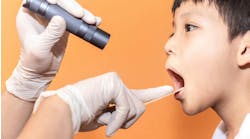OAK BROOK, Ill. — Poor and infrequent brushing may be the biggest obstacle keeping children from good oral health. That’s one of the key findings from a recent survey1 of American children’s oral health, conducted on behalf of Delta Dental Plans Association.
While nearly two out of five Americans (37%) report that their child’s overall oral health is excellent, more than a third of survey respondents (35%) admit their child brushes less than twice a day. Parents recognize this frequency as “not enough,” despite the fact that nearly all of those surveyed (96%) with children up to age 6 say they supervise or assist with brushing.
Among those who rate their child’s oral health as less than excellent, only 56% say their child brushes for at least two minutes, which is the amount of time dentists typically recommend spending on each brushing.
While the American Association of Pediatric Dentistry recommends daily flossing, nearly half (48%) of the survey respondents whose children have teeth say they have never been flossed; only 22% report that their child’s teeth are flossed daily.
Make brushing fun
Getting small children to brush properly can be a challenge, but here are some ideas that can help:
• Trade places: Tired of prying your way in whenever it's time to brush those little teeth? Why not reverse roles and let the child brush your teeth? It’s fun for them and shows them the right way to brush. Just don’t share a toothbrush. Sharing a toothbrush may result in an exchange of microorganisms and an increased risk of infections.
• Fun Toothbrush Holder/Toothbrush: Another way to get children to brush is by utilizing fun oral health devices such as robot-, tree-, or animal-shaped toothbrush holders that stick to walls. Kids like the characters and the holder provides a sanitary storage spot for their toothbrushes and toothpaste. Remember to apply just a small dab of toothpaste to the brush since the amount of fluoride in children’s toothpaste is still adult strength.
• Take turns: Set a timer and have the child brush for one minute. Then reset the timer and brush their teeth for the final minute.
• Call in reinforcements: If children stubbornly neglect to brush or floss, maybe it's time to change the messenger. Call the dental office before the next checkup and let them know what's going on. Kids might heed the same motivational message if it comes from a third party, especially the dentist.
“There’s clearly a need for more frequent and better education to teach practices that will ensure lifelong oral health,” said Dr. Bill Kohn, DDS, Delta Dental’s vice president for dental science and policy. “Since people overwhelmingly prefer the dentist as their primary source for oral health information, dental benefits that encourage preventive dental visits are crucial.”
About Delta Dental Plans Association
The not-for-profit Delta Dental Plans Association, based in Oak Brook, Ill., is the leading national network of independent dental service corporations. It provides dental benefits programs to more than 56 million Americans in more than 95,000 employee groups throughout the country. For more oral health news and information from Dr. Kohn and DDPA, subscribe to our blog and follow us on Twitter.
References
1. Morpace Inc. conducted the 2011 Delta Dental Children’s Oral Health Survey. Interviews were conducted by email nationally with 907 primary caregivers of children from birth to age 11. For results based on the total sample of national adults, the margin of error is ±3.25 percentage points at a 95 percent confidence level.
Latest
Latest





